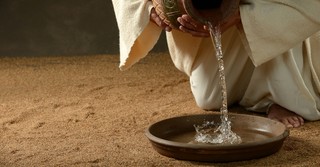
- Recent Translations
- All Translations
Luke 7:12
Share
Settings
Luke 7:12 Meaning and Commentary
Now when he came nigh to the gate of the city
Of Naim:
behold: there was a dead man carried out;
of the city; for they, used not to bury in cities, but in places without, and at some distance: the burying places of the Jews were not near, their cities {r}; and they had different ways of carrying them out to be buried, according to their different ages: a child under a month old was carried out in the bosom of a person; if a full month old, in a little coffin, which they carried in their arms; one of a twelve month old was carried in a little coffin on the shoulder; and one of three years old on a bier or bed, F19 and so upwards; and in this manner was this corpse carried out: who was
the only son of his mother;
hence the sorrow and mourning were the greater; see ( Zechariah 12:10 )
and she was a widow;
and if she had been supported by her son, her loss was very considerable; and having neither husband, nor son, to do for her, her case was very affecting:
and much people of the city was with her;
according to the age of persons was the company that attended them to the grave: if it was an infant, not a month old, it was buried by one woman, and two men, but not by one man, and two women; if a month old, by men and women; and whoever was carried out on a bier or bed, many mourned for him; and whoever was known to many, many accompanied him F20; and which was the case this dead man: he seems to have been well known and respected by the company that attended him to his grave; of these some were bearers, and these had their deputies, and these again theirs; for as they carried their dead a great way, they were obliged often to change their bearers; and of the company, some went before the bier, and others went after it F21: besides, what served to increase company at a funeral was, that it was looked upon as an act of kindness and mercy to follow a corpse to the grave F23; to which may be added, and what must always tend to increase the number at such a time, that, according to the Jewish canons F24
``it was forbidden to do any work at the time a dead man was buried, even one of the common people.''
F18 T. Bab. Kiddushin, fol. 80. 2. Gloss.
F19 T. Moed Katon, fol. 24. 1, 2. & Kiddashin, fol. 80. 2. Massech. Semachot, c. 3. sect. 2, 3. Maimon. Hilch. Ebel, c. 12. sect. 10, 11.
F20 Ut in locis supra citatis.
F21 Vid Misn. Beracot, c. 3. sect. 1.
F23 Maimon. in Misn. Peah, c. 1. sect. 1.
F24 Piske Tosaphot Megilla, art. 106. T. Bab. Moed Katon, fol. 27. 2.
Luke 7:12 In-Context
Videos for Luke 7:12
